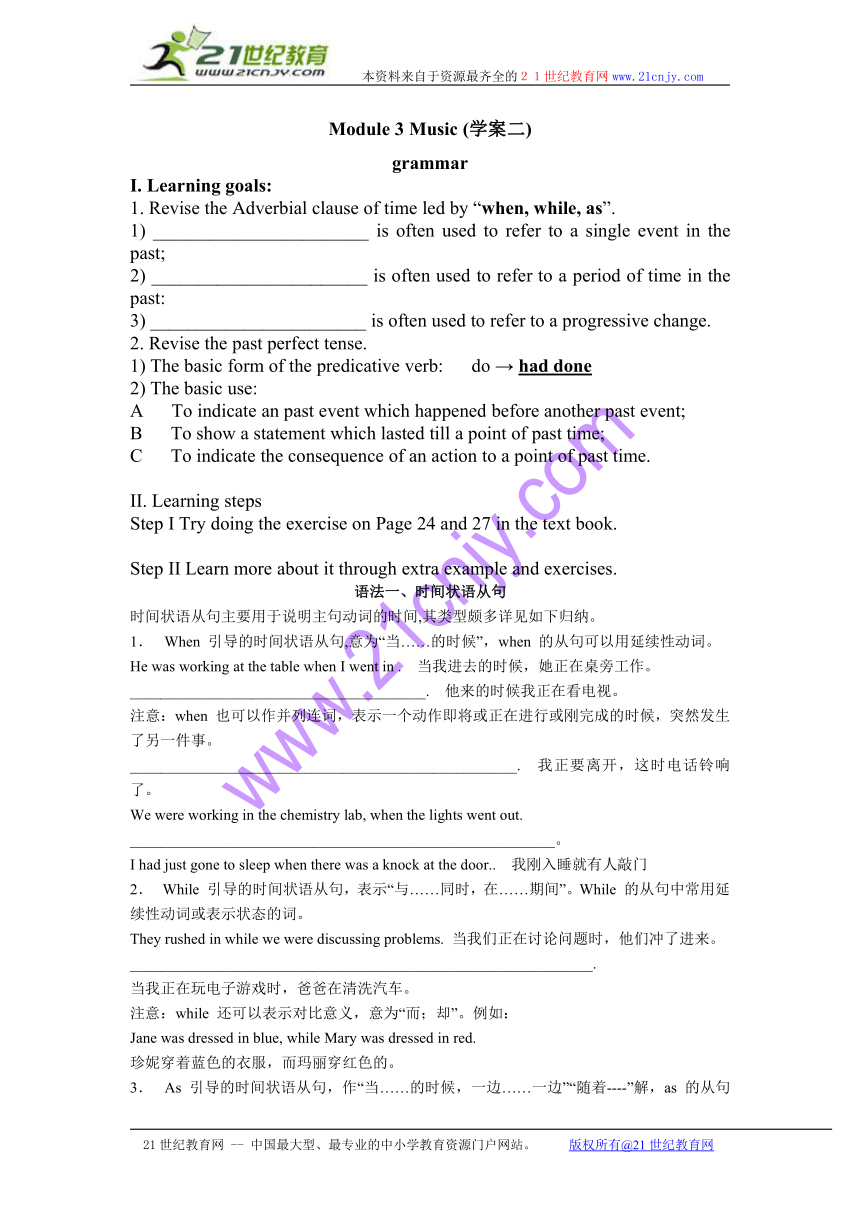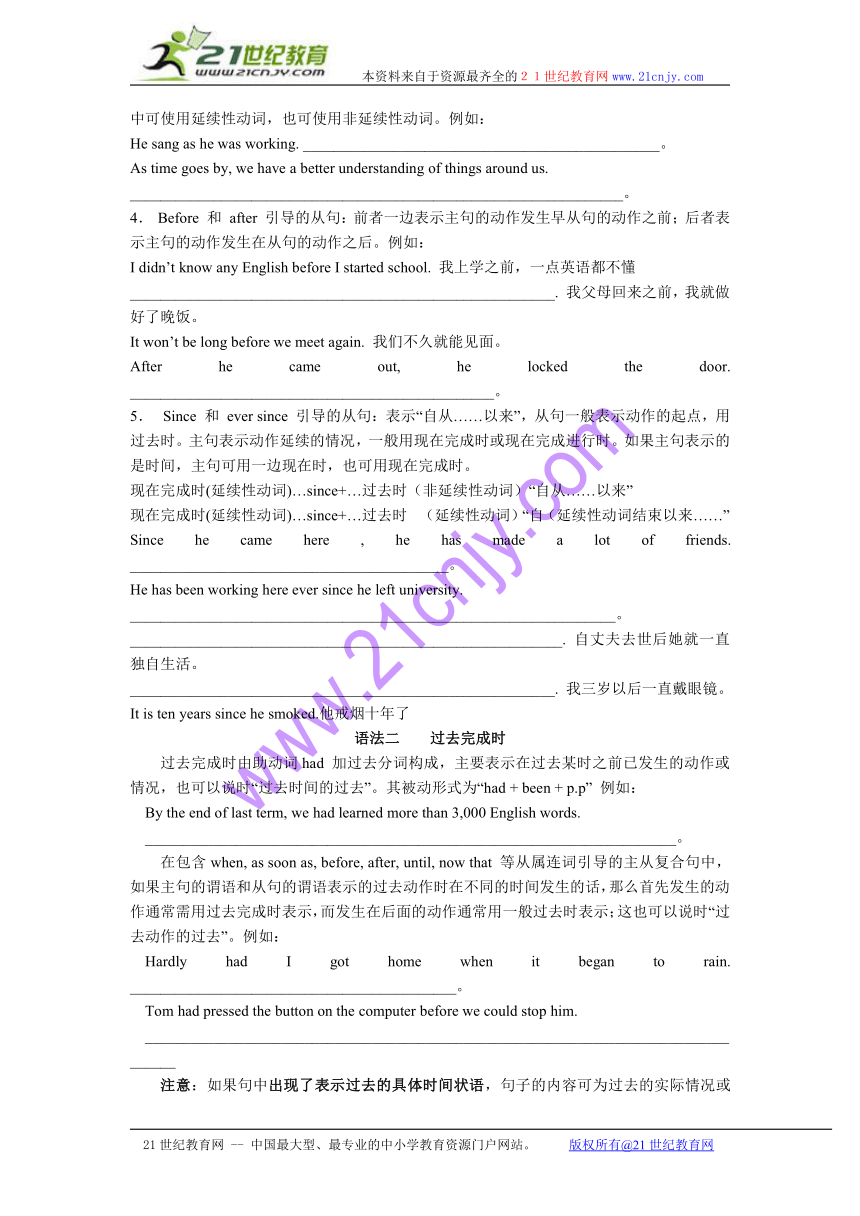Module 3 Music 语法学案(汉语讲解版)
文档属性
| 名称 | Module 3 Music 语法学案(汉语讲解版) |

|
|
| 格式 | rar | ||
| 文件大小 | 15.2KB | ||
| 资源类型 | 教案 | ||
| 版本资源 | 外研版 | ||
| 科目 | 英语 | ||
| 更新时间 | 2010-12-22 00:00:00 | ||
图片预览


文档简介
本资料来自于资源最齐全的21世纪教育网www.21cnjy.com
Module 3 Music (学案二)
grammar
I. Learning goals:
1. Revise the Adverbial clause of time led by “when, while, as”.
1) _______________________ is often used to refer to a single event in the past;
2) _______________________ is often used to refer to a period of time in the past:
3) _______________________ is often used to refer to a progressive change.
2. Revise the past perfect tense.
1) The basic form of the predicative verb: do → had done
2) The basic use:
A To indicate an past event which happened before another past event;
B To show a statement which lasted till a point of past time;
C To indicate the consequence of an action to a point of past time.
II. Learning steps
Step I Try doing the exercise on Page 24 and 27 in the text book.
Step II Learn more about it through extra example and exercises.
语法一、时间状语从句
时间状语从句主要用于说明主句动词的时间,其类型颇多详见如下归纳。
1. When 引导的时间状语从句,意为“当……的时候”,when 的从句可以用延续性动词。
He was working at the table when I went in . 当我进去的时候,她正在桌旁工作。
_______________________________________. 他来的时候我正在看电视。
注意:when 也可以作并列连词,表示一个动作即将或正在进行或刚完成的时候,突然发生了另一件事。
___________________________________________________. 我正要离开,这时电话铃响了。
We were working in the chemistry lab, when the lights went out.
________________________________________________________。
I had just gone to sleep when there was a knock at the door.. 我刚入睡就有人敲门
2. While 引导的时间状语从句,表示“与……同时,在……期间”。While 的从句中常用延续性动词或表示状态的词。
They rushed in while we were discussing problems. 当我们正在讨论问题时,他们冲了进来。
_____________________________________________________________.
当我正在玩电子游戏时,爸爸在清洗汽车。
注意:while 还可以表示对比意义,意为“而;却”。例如:
Jane was dressed in blue, while Mary was dressed in red.
珍妮穿着蓝色的衣服,而玛丽穿红色的。
3. As 引导的时间状语从句,作“当……的时候,一边……一边”“随着----”解,as 的从句中可使用延续性动词,也可使用非延续性动词。例如:
He sang as he was working. _______________________________________________。
As time goes by, we have a better understanding of things around us.
_________________________________________________________________。
4. Before 和 after 引导的从句:前者一边表示主句的动作发生早从句的动作之前;后者表示主句的动作发生在从句的动作之后。例如:
I didn’t know any English before I started school. 我上学之前,一点英语都不懂
________________________________________________________. 我父母回来之前,我就做好了晚饭。
It won’t be long before we meet again. 我们不久就能见面。
After he came out, he locked the door. ________________________________________________。
5. Since 和 ever since 引导的从句:表示“自从……以来”,从句一般表示动作的起点,用过去时。主句表示动作延续的情况,一般用现在完成时或现在完成进行时。如果主句表示的是时间,主句可用一边现在时,也可用现在完成时。
现在完成时(延续性动词)…since+…过去时(非延续性动词)“自从……以来”
现在完成时(延续性动词)…since+…过去时 (延续性动词)“自(延续性动词结束以来……”
Since he came here , he has made a lot of friends. __________________________________________。
He has been working here ever since he left university.
________________________________________________________________。
_________________________________________________________. 自丈夫去世后她就一直独自生活。
________________________________________________________. 我三岁以后一直戴眼镜。
It is ten years since he smoked.他戒烟十年了
语法二 过去完成时
过去完成时由助动词had 加过去分词构成,主要表示在过去某时之前已发生的动作或情况,也可以说时“过去时间的过去”。其被动形式为“had + been + p.p” 例如:
By the end of last term, we had learned more than 3,000 English words.
______________________________________________________________________。
在包含when, as soon as, before, after, until, now that 等从属连词引导的主从复合句中,如果主句的谓语和从句的谓语表示的过去动作时在不同的时间发生的话,那么首先发生的动作通常需用过去完成时表示,而发生在后面的动作通常用一般过去时表示;这也可以说时“过去动作的过去”。例如:
Hardly had I got home when it began to rain. ___________________________________________。
Tom had pressed the button on the computer before we could stop him.
___________________________________________________________________________________
注意:如果句中出现了表示过去的具体时间状语,句子的内容可为过去的实际情况或句子中的内容为历史事实时,句中的动词时态只能用一般过去时。例如:
The teacher said that it was Columbus who first discovered the American continent.
如果两个动作紧接着发生时,则常常不用过去完成时,而用一般过去时,特别是在包含before 和after 的复合句中。例如:
After we said goodbye to the farmers, we left the mountain village.
我们在和农民们告别了之后我们就离开了那个山村。
Just before I left Wenzhou, I sent my parents a telephone.
在离开温州之前我给我的父母打了一个电话。
在表示某人过去未曾完成的“心愿,打算,计划,想法,许诺”等等时,hope , mean ,plan, want ,promise , intend 等位于动词必须用过去完成时。例如:
I had planned to offer you some help in your shop, but suddenly my mother fell ill yesterday. 昨天我原本计划在你的店里帮一些忙的,但是我妈妈突然病了。
He had hoped to spend the important day with us last Sunday , but he was too busy then. 上星期他原本很想与我们一起度过这个重要的日子,可是他当时实在太忙了
一 单项选择
9. We hadn’t been out for long, _____ she felt sick.
A. When B. while C. after D. as
14.-Did Linda see the traffic accident
-No , no sooner ____ than it happened.
A. had she gone B. she had gone C. has she gone D. she has gone
16. He ____ more than 5,000 English words when he entered the university at the age of 15.
A has learned B. would have learned C. learned D. had learned
17. The policeman’s attention was suddenly caught by a small box which ___ placed under the Minster’s car.
A. has been B. had been C. was being D. would be
18. When the old man ____ to walk back to his house , the sun _____ itself behind the mountain.
A. started ; had already hidden B. had started; had already hidden
C. had started ; was hiding D. was starting ;hid
2、Why do you want a new job _____ you have got such a good one already (NMET 1998)
A.that B.where C.which D.when
4、----Was his father strict with him when he was at school
----Yes. He had never praised him _____ he became one of the top students in his grade.(北京2003春)
A.after B.unless C.until D.when
6、It was _____ back home after the experiment.
A.not until midnight did he go B.until midnight that he didn’t go
C.not until midnight that he went D.until midnight when he didn’t go
7、By the time we arrived at the farm, the farmers _____ all the apples and oranges.
A.would pick B.have picked C.were picking D.had picked
9、_____, the boy realizes what he should do and what he shouldn’t do.
A.When he grows older B.As he grows old C.While he grows older D.As he grows older
14、Mike invented this new type of robot _____ he was studying at the world-famous university.
A.when B.as C.while D.since
三 翻译句子
1. 没有收到他父母的来信他决定再写一封。
________________________________________________
2. 随着时间的流逝,情况变得更加糟糕。
_______________________________________________________
3. 当你发言的时候可以参考你的发言稿。(refer to)
__________________________________________________
4. 直到第二天上午看到玛丽,我才高兴起来。(强调句)
_______________________________________________________
5、到她十四岁的时候,他已经自学法语了。( by the time)
_____________________________________________________
21世纪教育网 -- 中国最大型、最专业的中小学教育资源门户网站。 版权所有@21世纪教育网
Module 3 Music (学案二)
grammar
I. Learning goals:
1. Revise the Adverbial clause of time led by “when, while, as”.
1) _______________________ is often used to refer to a single event in the past;
2) _______________________ is often used to refer to a period of time in the past:
3) _______________________ is often used to refer to a progressive change.
2. Revise the past perfect tense.
1) The basic form of the predicative verb: do → had done
2) The basic use:
A To indicate an past event which happened before another past event;
B To show a statement which lasted till a point of past time;
C To indicate the consequence of an action to a point of past time.
II. Learning steps
Step I Try doing the exercise on Page 24 and 27 in the text book.
Step II Learn more about it through extra example and exercises.
语法一、时间状语从句
时间状语从句主要用于说明主句动词的时间,其类型颇多详见如下归纳。
1. When 引导的时间状语从句,意为“当……的时候”,when 的从句可以用延续性动词。
He was working at the table when I went in . 当我进去的时候,她正在桌旁工作。
_______________________________________. 他来的时候我正在看电视。
注意:when 也可以作并列连词,表示一个动作即将或正在进行或刚完成的时候,突然发生了另一件事。
___________________________________________________. 我正要离开,这时电话铃响了。
We were working in the chemistry lab, when the lights went out.
________________________________________________________。
I had just gone to sleep when there was a knock at the door.. 我刚入睡就有人敲门
2. While 引导的时间状语从句,表示“与……同时,在……期间”。While 的从句中常用延续性动词或表示状态的词。
They rushed in while we were discussing problems. 当我们正在讨论问题时,他们冲了进来。
_____________________________________________________________.
当我正在玩电子游戏时,爸爸在清洗汽车。
注意:while 还可以表示对比意义,意为“而;却”。例如:
Jane was dressed in blue, while Mary was dressed in red.
珍妮穿着蓝色的衣服,而玛丽穿红色的。
3. As 引导的时间状语从句,作“当……的时候,一边……一边”“随着----”解,as 的从句中可使用延续性动词,也可使用非延续性动词。例如:
He sang as he was working. _______________________________________________。
As time goes by, we have a better understanding of things around us.
_________________________________________________________________。
4. Before 和 after 引导的从句:前者一边表示主句的动作发生早从句的动作之前;后者表示主句的动作发生在从句的动作之后。例如:
I didn’t know any English before I started school. 我上学之前,一点英语都不懂
________________________________________________________. 我父母回来之前,我就做好了晚饭。
It won’t be long before we meet again. 我们不久就能见面。
After he came out, he locked the door. ________________________________________________。
5. Since 和 ever since 引导的从句:表示“自从……以来”,从句一般表示动作的起点,用过去时。主句表示动作延续的情况,一般用现在完成时或现在完成进行时。如果主句表示的是时间,主句可用一边现在时,也可用现在完成时。
现在完成时(延续性动词)…since+…过去时(非延续性动词)“自从……以来”
现在完成时(延续性动词)…since+…过去时 (延续性动词)“自(延续性动词结束以来……”
Since he came here , he has made a lot of friends. __________________________________________。
He has been working here ever since he left university.
________________________________________________________________。
_________________________________________________________. 自丈夫去世后她就一直独自生活。
________________________________________________________. 我三岁以后一直戴眼镜。
It is ten years since he smoked.他戒烟十年了
语法二 过去完成时
过去完成时由助动词had 加过去分词构成,主要表示在过去某时之前已发生的动作或情况,也可以说时“过去时间的过去”。其被动形式为“had + been + p.p” 例如:
By the end of last term, we had learned more than 3,000 English words.
______________________________________________________________________。
在包含when, as soon as, before, after, until, now that 等从属连词引导的主从复合句中,如果主句的谓语和从句的谓语表示的过去动作时在不同的时间发生的话,那么首先发生的动作通常需用过去完成时表示,而发生在后面的动作通常用一般过去时表示;这也可以说时“过去动作的过去”。例如:
Hardly had I got home when it began to rain. ___________________________________________。
Tom had pressed the button on the computer before we could stop him.
___________________________________________________________________________________
注意:如果句中出现了表示过去的具体时间状语,句子的内容可为过去的实际情况或句子中的内容为历史事实时,句中的动词时态只能用一般过去时。例如:
The teacher said that it was Columbus who first discovered the American continent.
如果两个动作紧接着发生时,则常常不用过去完成时,而用一般过去时,特别是在包含before 和after 的复合句中。例如:
After we said goodbye to the farmers, we left the mountain village.
我们在和农民们告别了之后我们就离开了那个山村。
Just before I left Wenzhou, I sent my parents a telephone.
在离开温州之前我给我的父母打了一个电话。
在表示某人过去未曾完成的“心愿,打算,计划,想法,许诺”等等时,hope , mean ,plan, want ,promise , intend 等位于动词必须用过去完成时。例如:
I had planned to offer you some help in your shop, but suddenly my mother fell ill yesterday. 昨天我原本计划在你的店里帮一些忙的,但是我妈妈突然病了。
He had hoped to spend the important day with us last Sunday , but he was too busy then. 上星期他原本很想与我们一起度过这个重要的日子,可是他当时实在太忙了
一 单项选择
9. We hadn’t been out for long, _____ she felt sick.
A. When B. while C. after D. as
14.-Did Linda see the traffic accident
-No , no sooner ____ than it happened.
A. had she gone B. she had gone C. has she gone D. she has gone
16. He ____ more than 5,000 English words when he entered the university at the age of 15.
A has learned B. would have learned C. learned D. had learned
17. The policeman’s attention was suddenly caught by a small box which ___ placed under the Minster’s car.
A. has been B. had been C. was being D. would be
18. When the old man ____ to walk back to his house , the sun _____ itself behind the mountain.
A. started ; had already hidden B. had started; had already hidden
C. had started ; was hiding D. was starting ;hid
2、Why do you want a new job _____ you have got such a good one already (NMET 1998)
A.that B.where C.which D.when
4、----Was his father strict with him when he was at school
----Yes. He had never praised him _____ he became one of the top students in his grade.(北京2003春)
A.after B.unless C.until D.when
6、It was _____ back home after the experiment.
A.not until midnight did he go B.until midnight that he didn’t go
C.not until midnight that he went D.until midnight when he didn’t go
7、By the time we arrived at the farm, the farmers _____ all the apples and oranges.
A.would pick B.have picked C.were picking D.had picked
9、_____, the boy realizes what he should do and what he shouldn’t do.
A.When he grows older B.As he grows old C.While he grows older D.As he grows older
14、Mike invented this new type of robot _____ he was studying at the world-famous university.
A.when B.as C.while D.since
三 翻译句子
1. 没有收到他父母的来信他决定再写一封。
________________________________________________
2. 随着时间的流逝,情况变得更加糟糕。
_______________________________________________________
3. 当你发言的时候可以参考你的发言稿。(refer to)
__________________________________________________
4. 直到第二天上午看到玛丽,我才高兴起来。(强调句)
_______________________________________________________
5、到她十四岁的时候,他已经自学法语了。( by the time)
_____________________________________________________
21世纪教育网 -- 中国最大型、最专业的中小学教育资源门户网站。 版权所有@21世纪教育网
